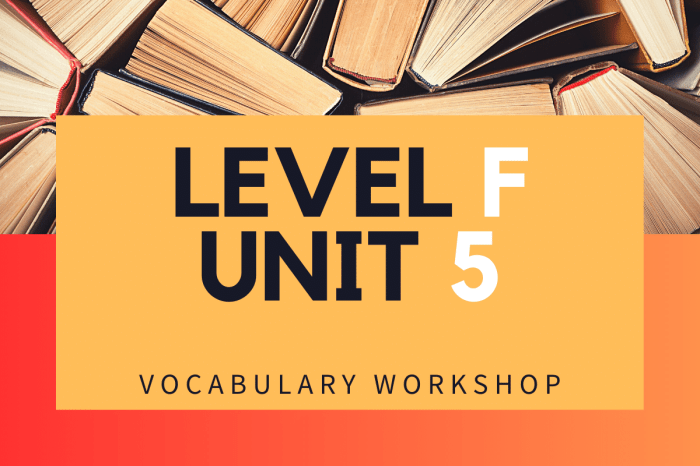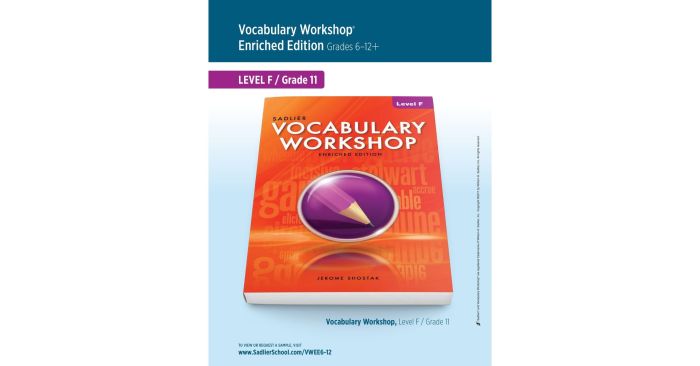Welcome to Vocab Workshop Level F Unit 5! This unit is designed to provide you with the tools and strategies to expand your vocabulary and improve your communication skills. Whether you’re a student, a professional, or simply someone who loves language, this unit has something to offer you.
In this unit, we’ll explore a variety of vocabulary-building activities, including games, puzzles, and exercises. We’ll also discuss the importance of vocabulary in communication and how to use new words effectively. By the end of this unit, you’ll have a better understanding of how to learn and use new words, and you’ll be well on your way to becoming a more confident and effective communicator.
Introduction

Vocab Workshop Level F Unit 5 delves into the fascinating world of words related to technology and communication.
This unit aims to enhance your vocabulary and comprehension skills by introducing you to key terms used in the realm of digital communication, social media, and technological advancements.
Vocabulary

This unit introduces a set of new vocabulary words that are essential for understanding the concepts discussed in the unit.These words are carefully chosen to enhance your vocabulary and comprehension skills. By understanding these words, you will be able to engage more effectively with the unit’s content.
Target Vocabulary Words
- Acquire:To obtain or come into possession of something.
- Alternative:A different or substitute choice.
- Capable:Having the ability or skill to do something.
- Contribute:To give or provide something to a common effort.
- Enthusiastic:Full of excitement or interest.
- Exceptional:Unusually good or remarkable.
- Flexible:Able to adapt or change easily.
- Foster:To encourage or support the development of something.
- Independent:Not dependent on others for support or direction.
- Innovative:Introducing new ideas or methods.
- Inspire:To fill someone with enthusiasm or motivation.
- Intriguing:Arousing curiosity or interest.
- Practical:Useful or sensible in real-world situations.
- Reliable:Able to be trusted or depended on.
- Resourceful:Able to find clever or practical solutions to problems.
- Skillful:Having or showing great skill or ability.
- Talented:Having a natural ability or aptitude for something.
- Versatile:Able to do many different things well.
Activities
This unit is packed with engaging activities designed to make vocabulary learning a breeze. From interactive games to thought-provoking discussions, each activity is meticulously crafted to enhance your vocabulary acquisition and retention.
These activities are not just fun and games; they are meticulously designed to target different learning styles and promote vocabulary acquisition. They provide ample opportunities for active engagement, repetition, and context-based learning, which are essential ingredients for effective vocabulary development.
Interactive Games
Interactive games are a cornerstone of this unit, as they provide a playful and engaging way to learn new words. These games challenge you to match words to definitions, unscramble letters to form words, and engage in friendly competition with peers.
Through these games, you will effortlessly expand your vocabulary while having a blast.
Thought-provoking Discussions
Thought-provoking discussions are another integral part of this unit. By actively participating in discussions and sharing your insights, you will not only deepen your understanding of new words but also develop your critical thinking and communication skills. These discussions provide a platform for you to connect with fellow learners and explore the nuances of language.
Context-based Activities
Context-based activities are essential for vocabulary retention. This unit incorporates a variety of activities that place new words in meaningful contexts, such as reading passages, listening to audio recordings, and engaging in role-playing scenarios. By experiencing words in real-life contexts, you will effortlessly absorb their meanings and usage.
Assessment
In this unit, we employ various assessment strategies to evaluate student progress in vocabulary acquisition and application. These assessments are designed to measure students’ understanding of new vocabulary, their ability to use it accurately and effectively, and their overall comprehension of the unit’s content.
If you’re looking to expand your vocabulary, the Vocab Workshop Level F Unit 5 is a great place to start. The unit focuses on words related to the short story “The October Game” by Ray Bradbury here . By the end of the unit, you’ll be able to use these words confidently in your own writing and speaking.
The assessments include:
- Vocabulary Quizzes:Short quizzes that test students’ knowledge of the unit’s vocabulary words, including their definitions, synonyms, and usage in context.
- Sentence Completion Exercises:Students are given sentences with missing words and must choose the correct vocabulary word from a provided list to complete the sentence.
- Writing Assignments:Students are required to write short paragraphs or essays using the vocabulary words from the unit, demonstrating their understanding and ability to apply them in different contexts.
- Class Discussions:Active participation in class discussions allows students to demonstrate their comprehension of the vocabulary and their ability to use it in real-world situations.
Assessment Strategies, Vocab workshop level f unit 5
These assessments are used to provide both formative and summative feedback to students and teachers. Formative assessments, such as vocabulary quizzes and sentence completion exercises, are used throughout the unit to monitor student progress and identify areas where additional support is needed.
Summative assessments, such as writing assignments and class discussions, are used at the end of the unit to evaluate students’ overall understanding of the vocabulary and their ability to use it effectively.
Differentiation: Vocab Workshop Level F Unit 5
Differentiation involves tailoring instruction to meet the individual needs of students. This ensures that all learners can access and engage with the content effectively.
Differentiated strategies support students with diverse learning styles and abilities by providing multiple pathways to learning, accommodating different learning paces, and offering varied levels of challenge.
Instructional Strategies
- Flexible Grouping:Group students based on their strengths, interests, or learning needs, allowing for targeted instruction.
- Tiered Assignments:Provide assignments with varying levels of difficulty, allowing students to work at their own pace and challenge level.
- Learning Contracts:Negotiate individualized learning goals and activities with students, empowering them to take ownership of their learning.
- Choice Boards:Offer students a variety of activities to choose from, allowing them to select tasks that align with their interests and learning styles.
li> Technology Integration:Utilize technology to provide interactive learning experiences, differentiated resources, and adaptive assessments.
Assessment Strategies, Vocab workshop level f unit 5
- Alternative Assessments:Provide multiple assessment formats, such as portfolios, projects, or presentations, to accommodate different learning styles and abilities.
- Feedback:Offer specific and timely feedback that is tailored to each student’s needs, providing guidance and support for improvement.
- Self-Assessment:Encourage students to reflect on their own learning and identify areas for growth, fostering metacognition and self-directed learning.
Extension Activities
Extending vocabulary learning beyond the classroom enriches language acquisition and fosters a love for words. By engaging in diverse activities, students can explore the nuances of language, expand their vocabulary, and develop a lifelong appreciation for the power of words.
These activities not only reinforce vocabulary learned in class but also encourage students to interact with language in meaningful and engaging ways, fostering continued vocabulary growth and a deeper understanding of the language’s richness.
Games and Activities
- Word puzzles:Crosswords, word searches, and anagrams challenge students to manipulate words and discover new meanings.
- Vocabulary charades:Acting out words or phrases encourages students to use body language and context clues to communicate, expanding their vocabulary and comprehension.
- Storytelling games:Storytelling activities, such as “Would You Rather” or “Two Truths and a Lie,” provide opportunities to practice vocabulary in context and develop fluency.
Reading and Writing
Encourage students to read widely and engage with different genres. Reading exposes students to new words and their usage, while writing allows them to practice using vocabulary in meaningful contexts.
- Vocabulary notebooks:Students can maintain personal vocabulary notebooks to record new words encountered in reading and writing.
- Word of the day:Displaying a new word each day and discussing its meaning and usage fosters regular exposure to new vocabulary.
- Creative writing:Encourage students to incorporate new vocabulary into their writing, promoting word usage and retention.
Technology and Media
Leverage technology and media to provide interactive and engaging vocabulary-building experiences.
- Vocabulary apps:Educational apps offer interactive games, quizzes, and exercises to enhance vocabulary learning.
- Podcasts and audiobooks:Listening to podcasts and audiobooks exposes students to rich vocabulary and authentic language use.
- Language exchange programs:Connecting with native speakers through language exchange programs allows students to practice vocabulary in real-world situations.
FAQ Guide
What is the purpose of Vocab Workshop Level F Unit 5?
The purpose of Vocab Workshop Level F Unit 5 is to help students expand their vocabulary and improve their communication skills.
What are the benefits of learning new vocabulary?
There are many benefits to learning new vocabulary, including improved communication skills, increased reading comprehension, and enhanced cognitive function.
How can I learn new vocabulary effectively?
There are many effective ways to learn new vocabulary, including reading, writing, speaking, and using flashcards.